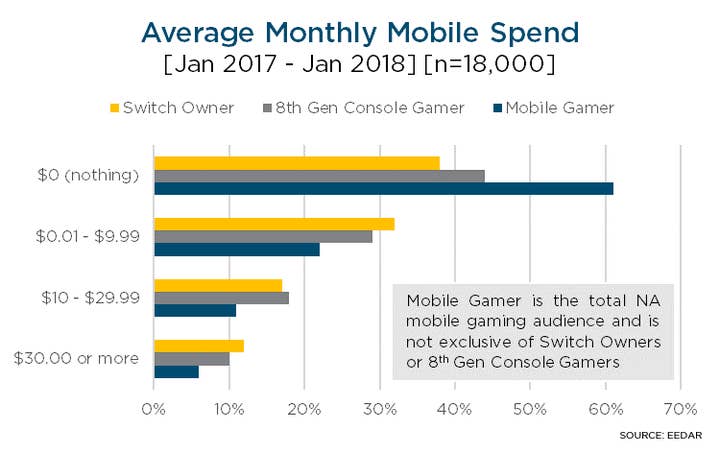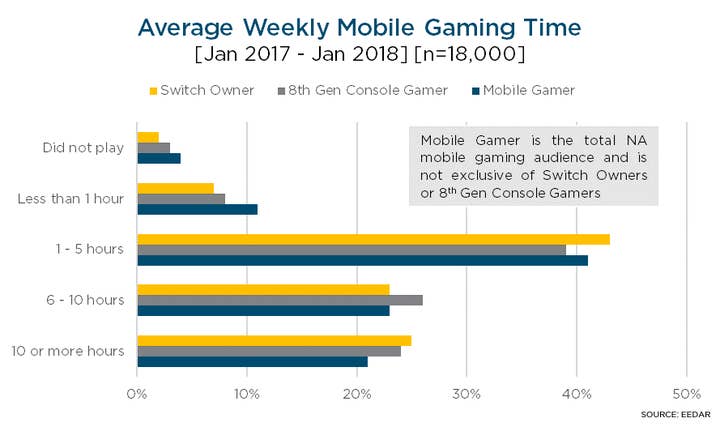Why you should (and shouldn't) port your mobile game to the Switch
EEDAR senior analyst Matt Diener finds that Switch players are big mobile spenders - will that lead to successful mobile adaptations?
Nothing about the Switch's first year success should be surprising. It's an innovative piece of hardware that lends itself equally well to portable and living room gaming, and its first year launch library is one of the strongest in recent memory.
What is surprising about the Switch, however, is that its player base is engaging with mobile games at a rate that is consistent with - and slightly higher than - the average of 8th gen console owners. They're also more strongly engaged with mobile games than the average North American mobile gamer. In other words, Switch owners are still heavily engaged with games on their phones and tablets despite owning the most portable HD console currently available.
This surprising finding comes from EEDAR's PlayerPulse tracker - an ongoing survey that polls 1,500 active North American gamers per month about their habits and title awareness across mobile, PC and Console platforms. (Note that all data below is based on an aggregated 12-month sample collected from January 2017 to January 2018 and encompasses the launch of the Nintendo Switch.)

In the chart above (pulled from PlayerPulse), it's clear to see that Switch owners are more deeply engaged with mobile games than their 8th gen console-owning counterparts; 38 per cent of North American Switch owners reported that they did not spend on mobile games, which compares favorably to the 44 per cent of console gamers who indicated they didn't spend on mobile games.
Both segments are still more invested (in terms of spend) than the broader North American mobile gaming audience, of which 62 per cent reported no spend in mobile games.
The ceiling for a Switch owner's spend is also higher than the average for mobile gamers or total 8th gen console owners; 12 per cent of Switch owners reported spend of $30 or more per month, compared against 8 per cent of console gamers and 6 per cent of North American mobile gamers who reported the same spend.

Setting money aside, Switch owners are also not shy about investing their time in mobile games. A full quarter of surveyed Switch owners, 25 per cent, indicated they played ten or more hours in mobile games in a given week, which is slightly ahead of the most mobile-invested console owners (23 per cent reported the same) and mobile gamers (21 per cent).
While Switch owners are ahead of the pack for spend and investment, this pattern of engagement fits with a larger trend that EEDAR has observed amongst North American gamers. The most hardcore and invested players are playing, and paying, on multiple platforms and aren't necessarily making 'either-or' decisions when it comes to gaming.
Given this pattern of investment, it seems like porting mobile games to the Switch should be a recipe for easy success. Right?
Red ocean or blue ocean?
The answer as to whether a mobile port will find success on the Switch is unfortunately more nuanced, though it's clear from the past year's trends that Switch owners are not abandoning mobile wholesale for their new hybrid handheld.
"It seems likely, then, that Switch owners are using mobile and the Switch to scratch two entirely different gaming itches"
While the Switch is an extremely portable device, it's not quite as pocketable and suited to one- to three-minute play sessions as the average smartphone is - and the omnipresent smartphone still wins when convenience and low-investment entertainment is the main concern. Conversely, the Switch is home to some extremely impressive games, namely The Legend of Zelda: Breath of the Wild and Super Mario Odyssey (to say nothing of The Elder Scrolls V: Skyrim).
While these sprawling, 50- to 250-hour games have loops that can be pared down to fit in an on-the-go friendly 20- or 30-minute play session, these are games of a completely different scale than what many mobile games offer and can easily command player attention for marathon, all-night gaming sessions. It seems likely, then, that Switch owners are using mobile and the Switch to scratch two entirely different gaming itches - but none of this means the Switch should be overlooked for mobile ports entirely.
Long-session mobile games that require a player's constant attention for 10- to 20-minutes have not been as successful in North America as they are in other markets, and the Switch might be the perfect home for them. Tencent's built-for-mobile MOBA Arena of Valor, for example, isn't performing as strongly in the US as it is in China, and the modest success of Super Evil Megacorp's mobile MOBA Vainglory suggests that it may never. But Arena of Valor may find the invested Western audience it's been looking for when it's released on the Switch later this year.
One doesn't preclude the other
Mobile publishers looking to find success on the Switch must keep the data from the past year in mind: Switch owners are still playing, and paying, heavily on mobile platforms even with the portable console's impressive launch year and award-winning exclusives.
To bring a game with a one- to two-minute core loop from mobile to the Switch and expect breakout success may show a fundamental misunderstanding of how Switch owners have chosen to consume gaming content over the past year.
Instead, publishers with titles that have been branded as being too core for mobile may want to consider the Switch as an untapped audience willing to engage with their game.
And if you're a mobile publisher without one of these titles, there's no need to despair - there's a good chance Switch owners are still playing your game anyway.
Matt Diener leverages his academic background in cultural anthropology and ethnographic research as the head of EEDAR's focus group product line. Prior to working at EEDAR, he worked as a games journalist and reviewer focusing on mobile and handheld games. To learn more about EEDAR's PlayerPulse syndicated survey data, contact Cooper Waddell at cwaddell@eedar.com.







